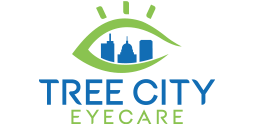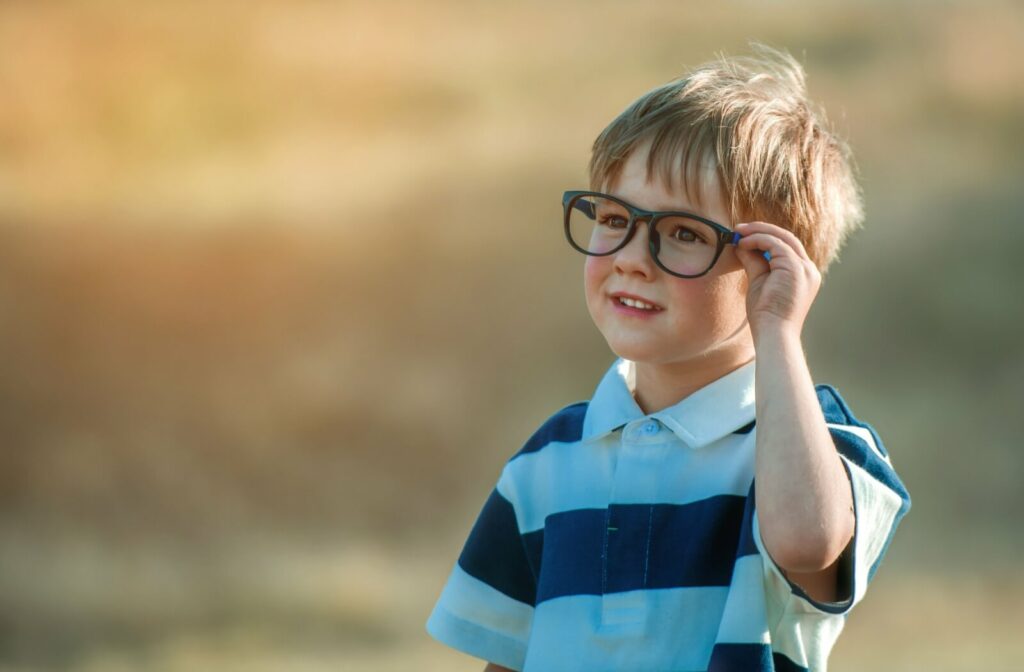Nearsightedness (myopia) is one of the most common reasons that kids end up needing glasses. In fact, many kids end up needing multiple new pairs of glasses as they grow and their eyes change.
It’s not always possible to stop kids from developing myopia, but there are habits that can help slow its development. Tips for parents who want to help their kids avoid and manage myopia include:
- Encouraging your child to spend more time outdoors.
- Limiting screen time for your child.
- Scheduling regular eye exams.
While it may not be possible for your child to completely avoid nearsightedness, it can still be managed with myopia control—a program that can slow the progression of myopia and help your child maintain a lower prescription. Routine eye exams are crucial for determining when to start myopia control, especially if your child is at risk of developing the condition.
What Causes Myopia?
Typically, myopia is caused by elongation of the eye. In some cases, it can also be caused by a cornea that is too curved. In either case, when the eye is misshapen, light that should focus on the retina instead focuses in front of it, leading to blurry distance vision.
How Do You Know Your Child Is At-Risk for Myopia?
The most common myopia risk factor for children is a parent who has myopia. Other risk factors for myopia include:
- Other genetic factors related to ethnicity
- Spending too much time doing close-up vision activities like reading
- Not spending enough time outdoors
Signs Your Child May Have Myopia
The following habits and behaviors are all common warning signs that your child may have myopia:
- Sitting too close to screens
- Holding books too close to their face
- Frequent squinting
- Difficulty playing sports that require hand-eye coordination
- Headaches
- Eye strain, especially when using distance vision
- Poor performance in school and shortened attention spans
Remember that your child may not always be able to tell you that they’re having vision problems. In fact, with their limited experience, they may not even realize that they are having issues with their vision. That’s why it’s important to watch for these warning signs and schedule regular eye exams.
Strategies to Help Prevent & Manage Myopia
The following habits and strategies aren’t guaranteed to prevent myopia, but there is some evidence that they can help prevent or slow its progression.
Encourage Outdoor Activity
Some studies show that spending time outdoors as a child can result in reduced myopia as an adult. Specifically, increasing time spent outdoors by 1–3 hours per day could reduce your child’s myopia risk by as much as 50%.
Limit Screen Time
Screen time, particularly screen time spent in front of a computer, can be a significant risk factor for myopia development. This link may also be related to the connection between education, close vision work, and myopia. Many schoolchildren show higher rates of myopia, particularly when they spend more time studying. We recommend no more than one hour of screen time outside of school per day.
Schedule Regular Eye Exams
When it comes to myopia prevention and management, early detection is important. Nearsightedness tends to get worse over time as the eyes grow and get longer. When that happens, kids end up needing new, stronger glasses as they get older, and some kids can even develop high myopia—a condition that can significantly increase their risk of developing other serious eye issues.
With regular eye exams, we can catch myopia during its early stages, monitor your child’s eye growth, and help preserve your child’s sight with myopia control.

What Is Myopia Control?
Myopia control is a form of eye care based on slowing the progression of myopia by controlling the growth of the eye. There are several specialty lenses and forms of medication available. At our practice, we offer ortho-k (orthokeratology) contact lenses, soft multifocal contact lenses, and atropine eye drops.
Ortho-K Contact Lenses
Orthokeratology (ortho-k) lenses gently reshape the cornea overnight, offering clear vision during the day without the need for glasses or contacts. Studies show ortho-k lenses can slow myopia progression by up to 50%. This is ideal for children who are active or prefer a glasses-free experience.
Soft Multifocal Contact Lenses
Daily disposable contacts, like MiSight and NaturalVue contact lenses, can correct vision while slowing eye elongation. These lenses are safe, convenient, and designed specifically for myopia management.
Atropine Eye Drops
Low-dose atropine drops are a simple, noninvasive option to reduce myopia progression. Applied at bedtime, these drops help relax the eye’s focusing mechanism and can be especially effective for younger children.
Let’s Talk About What Your Child Needs
If there’s one important piece of advice we can give to all parents, it’s to remember that every child is different. When you visit us for an eye exam, we always consider what makes your child and their vision unique—and we offer personalized care based on their needs.
If you’re concerned about your child’s vision or want to know more about their risk of developing myopia, contact us and schedule your next eye exam. At Tree City Eyecare, we are always happy to answer your questions—and all your child’s questions too.


